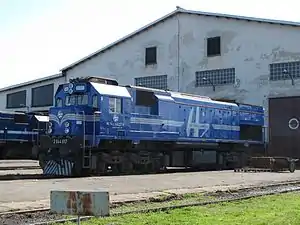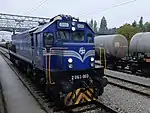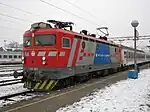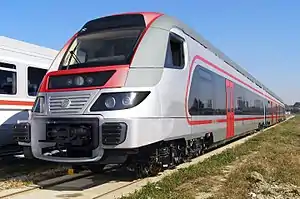This is a list of past and present rolling stock owned and operated by Croatian Railways, consisting of diesel locomotives, electric locomotives, diesel multiple units, electric multiple units and railroad cars. When the company began operation in 1991, it was with a collection of equipment inherited from „ŽTP Zagreb“ – a Croatian division of Yugoslav Railways. Much of this equipment was later refurbished/modernized and remains in use today. Over the years, Croatian Railways has supplemented this initial fleet with new orders and with new acquisitions of secondhand equipment from other operators.
Diesel locomotives
| Designation | Build year | Total units | Producer | AAR wheel arrangement | Power output | Image |
|---|---|---|---|---|---|---|
| HŽ 2041 | 1962–65 | 10 | Brissoneau et Lotz / Đuro Đaković | Bo'Bo' | 606 kW |  |
| HŽ 2044 | 1981 | 15 | EMD-GM / Đuro Đaković | (A1A)'(A1A)' | 1,826 kW |  |
| HŽ 2062 | 1972–73 | 18 | EMD-GM / Đuro Đaković | Co'Co' | 1,640 kW |  |
| HŽ 2063 | 1972 | 2 | EMD-GM | Co'Co' | 2,461 kW |  |
| HŽ 2132 | 1959–63, 1965–78 | 102 | Jenbach / Đuro Đaković / TŽV Gredelj | C | 397 kW | .JPG.webp) |
Electric locomotives
Currently HŽ Putnički Promet and HŽ Cargo maintains respectively 17 and 29 Electric HŽ 1141 Locomotives, all of which will undergo modernization and upgrade[1] under contract signed with the Končar company last year. HŽ is leasing further 9 HŽ 1141 locomotives to third parties.[2] Of the total 46 HŽ 1141 locomotives currently active, 17 locomotives are used pulling passenger coaches and 29 are used in HŽ Cargo, however 3 HŽ 1141 locomotives were damaged in recent rail accidents and are out of service due to extensive repairs. Eventually all HŽ 1141 locomotives currently in service with the Croatian railways will be transferred and solely used by HŽ Cargo, leaving HŽ 1142 as sole locomotive with HŽ Putnički Promet.
| Designation | Build year | Total units | Producer | AAR wheel arrangement | Power output | Image |
|---|---|---|---|---|---|---|
| HŽ 1141 | 1968–72, 1981–85, 1987, 2002–03, 2008–18 | 46[3] | ASEA / Končar | Bo'Bo' | 3,860 kW |  |
| HŽ 1142 | 1981–1988 | 15 | Končar | Bo'Bo' | 4,400 kW | .jpg.webp) |
| Vectron X4 A17 | 2017 | 4[4] | Siemens | Bo'Bo' | 5,600 kW |  |
DMUs
HZ, national railway operator will introduce 7 additional Diesel electric train sets for regional passenger service, all 7 train sets should be delivered by end of 2025.[5] National rail operator also plans to purchase additional intercity trains, 6 sets for total of €47.78 million, or around €8. million per train on Zagreb - Split route.[6][7] Current HŽ 7123 lacks the capacity for the route which in summer months is very popular with the tourist. However as the line between Ogulin - Split isn't electrified, currently only Diesel powered trains or DMUs have the range, there are plans to build a link between Drežnica, via Otočac to Perušić and on to Gospić, Gračac and Split, which would be eventually electrified, however these are longer term plans. One of the requirement for six new DMUs is that they're equipped with the tilting technology, which excludes Croatian manufacturer Koncar. Alstom, Stadler or Simens could be providing six new trains, which won't be financed by the EU as it was the case with EMUs. New trains should be in service by 2026, according to the statement issued by the Croatian Government.
| Designation | Build year | Total units | Producer | AAR wheel arrangement | Power output | Image |
|---|---|---|---|---|---|---|
| HŽ 7022 | 2012 | 1 | TŽV Gredelj | Bo'2'+2'Bo'+2Bo' | 1,390 kW[8] |  |
| HŽ 7023 | 2015–present | 12[9][10][11] | Končar, Croatia | Bo’2’2’Bo’ | N/A | .jpg.webp) |
| HŽ 7121 | 1980–86 | 31 | Đuro Đaković | Bo'Bo' + 2'2' | 2x210 kW |  |
| HŽ 7122 | 1980–1981 | 25 | FIAT / KALMAR | (1A)"(1A)" | 2x147 kW | .JPG.webp) |
| HŽ 7123 | 2004 | 6 | Bombardier Transportation | 2'B' 2'B' | 2x560 kW | .JPG.webp) |
EMUs
Currently national operator utilizes two EMU types, Hungarian built Ganz EMUs which were purchased in late 70s and Koncar built EMUs that came in to service from 2011. Plan is to replace all Ganz made EMUs by late 2025 with only Koncar built units. 12 brand new EMUs are on order and should be delivered by late 2025. Eventually Hrvatske Zeljeznice hopes top operate around 72-84 EMUs built by Koncar, 12 of which planned to be 5 section regional trains, 12 four section regional trains and 55-60 four section local trains.
| Designation | Build year | Total units | Producer | AAR wheel arrangement | Power output | Image |
|---|---|---|---|---|---|---|
| HŽ 6111 | 1976–79 | 21 | Ganz Mávag | 2'2'+Bo'Bo'+2'2' | 1,200 kW |  |
| HŽ 6112 | 2011–2024 | 55 | Končar | Bo'2'2'2'Bo | 2,000 kW |  |
Battery electric multiple unit
National Rail operator Hrvatske Zeljeznice signed a contract for 2 Battery electric multiple unit train sets in contract valued at €17.1 million.[12] National rail operator Croatian Railways hopes to secure an order of additional 60 brand new battery electric multiple units by 2030, replacing all but 20 DMUs that entered service in past decade, namely, HŽ 7022, HŽ 7023 and HŽ 7123 series.[13] National rail operator will install required battery storage/charging facilities at main railway stations that are currently not connected to electrified rail network. Stations include, Split, Osijek, Varazdin, Bjelovar, Virovitica, Gospic and Pula.[14][15][16]
| Designation | Build year | Total units | Producer | AAR wheel arrangement | Power output | Image |
|---|---|---|---|---|---|---|
| TBA | TBA | 2 on order | Končar, Croatia | Bo'2'2'2'Bo | 2,000 kW |
Passenger railroad cars
.jpg.webp)
Passenger railroad cars currently owned by Croatian Railways follow the general Eurofima coach design. Majority of them were manufactured in the factory Goša FOM between the 1970s and 1990s, and in 1991 they were inherited from Yugoslav Railways (division “ŽTP Zagreb”).
Mainly during the 2000s, all railroad cars of the rolling stock were modernized in TŽV Gredelj to cope with demands of quality service in modern times. During the modernization, the cars intended for the transport of passengers in trains of the highest rank (including 1st and 2nd class cars, dining car and sleeping cars) received air conditioning, a completely new interior and exterior, installation of a closed vacuum toilet system, installation of doors with automatic control, etc. During the first years of company's existence and later, especially after the appearance of the first newly reconstructed cars in 2003, there was a surplus of first-class cars in the fleet, and for that reason, a large number of originally first-class cars were gradually transformed into lower-class cars. On later reconstructions, these cars only underwent some minor modifications (exterior painting in the new colour scheme, replacement of the seats and interior wall panels, etc.) and were gradually phased out of traffic during the 2010s and 2020s.[17]
Croatian Railways also has cars jointly produced by the factories "Janko Gredelj" and "Boris Kidrič" in the mid-1980s, that were reconstructed and modernized in TŽV Gredelj between 2011 and 2012. Cars received air-conditioning, new side doors with automatic control, complete new interior, closed vacuum toilet system, etc.
Car types
Although each car of the fleet has its own numerical ID, the type of the car is additionally recognized by the letter designation, which is a combination of capital and lowercase letters in the name of the car. The letter mark of the car, together with the numerical mark, is located on the sides of each car.
Capital letters in the letter mark of the car:
A – first class car
B – second class car
AB – first and second class car
WL – sleeping car
WR – dining (restaurant) car
Lowercase letters in the letter mark of the car:
aa – car with two axles (withdrawn from active rolling stock)
c – couchette car
ee – car with electricity supply exclusively through the passing electric line
t – car with seats and a passage in the middle (opposite to corridor car)
l – car with an audio system
m – car longer than 24,50 meters (80.3 feet)
List of active railroad cars
Below is the list of active railroad cars in the rolling stock of Croatian Railways according to their types and characteristics as of May 2022:[18][19][20][21][22][23][24]
| Letter mark of the car | Built | Reconstructed | In service | Notes |
|---|---|---|---|---|
| Aeelt | 1976–1983 | 2003 | 11 | First class-only air-conditioned car for international and domestic traffic with seats and a passage in the middle; original car type: A, B, AB |
| Bee | 1976–1984 | 2004–2009 | 43 | Second class-only air-conditioned corridor car for international and domestic traffic; original car type: A, B, AB |
| Beemt | 1991 | 2009–2010 | 7 | Second class-only air-conditioned car with seats and a passage in the middle, for international and domestic traffic; original car type: Aeelmt |
| ABee | 1984 | 2008 | 5 | First and second class air-conditioned corridor car for international and domestic traffic; original car type: AB, B |
| ABeemt | 1991 | 2009– 2010 | 4 | First and second class air-conditioned car with seats and a passage in the middle, for international and domestic traffic; original car type: Aeelmt |
| Beelt | 1976–1977 | 1997–2002 | 3 | Second class-only air-conditioned car with seats and a passage in the middle, for international and domestic traffic; original car type: AB, B |
| WLee | 1980 | 2004 | 10 | Air-conditioned corridor sleeping car for international and domestic traffic |
| WLl | 1980 | 2 | Corridor sleeping car for international and domestic traffic | |
| BCee | 1984 | 2008 | 7 | Second class-only air-conditioned corridor couchette car for international and domestic travel - the beds can be converted into seats for the daytime travel; original car type: B |
| BCl | 1984 | 8 | Second class-only corridor couchette car for international and domestic traffic - the beds can be converted into seats for the daytime travel | |
| WRee | 1980 | 1995–1997, 2005 | 2 | Air-conditioned dining car for international and domestic traffic |
| Beet | 1986–1987 | 2011–2013 | 20 | Second class-only air-conditioned car for domestic traffic with seats and a passage in the middle; only type of car in the active fleet manufactured by "Janko Gredelj" and "Boris Kidric"; original car type: Bt |
| Bee | 1983–1986 | 2006–2009 | 5 | Second class-only corridor car for international and domesti traffic, some units have space for bicycles; original car type: A, B |
Withdrawn stock
- HŽ 1061 (electric locomotive)
- HŽ 1161 (electric locomotive)
- HŽ 2061 (diesel locomotive)
- HŽ 2062-1 (diesel locomotive)
- HŽ 2042 (diesel locomotive)
- HŽ 2043 (diesel locomotive)
- HŽ 2131 (diesel shunter)
- HŽ 2133 (diesel shunter)
- HŽ 2141 (diesel shunter)
- HŽ 6011 (electric multiple unit, withdrawn in 2009)
- HŽ 7021 (DMU)
- HŽ 7221 (railbus; withdrawn in 2009)
- HŽ Al / Bl (passenger railroad car series for international and domestic traffic built between the 1960s and 1980s, withdrawn during the 2010s and 2020s)
- HŽ Baat (two-axle passenger railroad car series for domestic traffic built in the 1960s and withdrawn during the first half of the 2000s)
Rented locomotives and test vehicles in Croatia
- HŽ series 1081 -> These were rented from PKP Poland in 1995-1996
- FS E 402B -> Italian locomotive was on test
- V43 -> Hungarian locomotive used on Botovo-Koprivnica-Zagreb line
Renumbering
In 1993 HŽ renumbered all their vehicles. This results in some confusion to the relation to their previous numbers. All other companies, which have been formed after dissolution of JŽ have kept the original numbers.
Higher speed passenger travel
In Croatia, these well known international brand names were on test:
Hrvatske Željeznice wants to modernise and speed up passenger traffic since they are limited to max. 160 km/h. There have been tests performed with both trains. Although they performed well they were not purchased, due to a lack of funds. It is planned to upgrade the track to 200 – 250 km/h in future. These units will most likely not be purchased at the end. A cheaper solution for passenger traffic is sought.
See also
References
- ↑ "HŽ Cargo i Končar-KEV sklopili ugovor za obnovu lokomotiva, produljuju im rok trajanja za još 14 godina".
- ↑ "Railfaneurope.net, the European Railway Server".
- ↑ "HŽ Cargo i Končar-KEV sklopili ugovor za obnovu lokomotiva, produljuju im rok trajanja za još 14 godina".
- ↑ "Jutarnji list - HŽ Cargo uzeo u najam električnu lokomotivu, 2021. U planu još tri". 13 November 2020.
- ↑ "HŽ za dvije godine dobiva sedam novih suvremenih vlakova". 3 October 2023.
- ↑ "Jutarnji list - Veliki rast broja putnika u 2022., iduće godine očekuju se još bolji rezultati: Posebna pogodnost za studente". 15 December 2022.
- ↑ https://vlada.gov.hr/UserDocsImages/2016/Sjednice/2022/Studeni/166%20sjednica%20VRH/166%20-%202.1.%20h).pdf
- ↑ http://tzv-gredelj.hr/component/attachments/download/386.html
- ↑ "HŽ za dvije godine dobiva sedam novih suvremenih vlakova". 3 October 2023.
- ↑ "New electric trains to improve reliability and service on Croatia's rail network-Projects".
- ↑ "Ugovor za baterijske vlakove".
- ↑ "Ugovor za baterijske vlakove".
- ↑ "HŽ kupio nove baterijske vlakove! Ekipa Danasa se provozala u novim vozilima". 21 December 2022.
- ↑ "Tri nova vlaka za putnički prijevoz i Ugovor za baterijske vlakove".
- ↑ "HŽ predstavio nove baterijske vlakove koji mogu postići brzinu do 160km/H! Do 2025. Plan je da ih imamo ukupno 70". 22 December 2022.
- ↑ "Velika ulaganja u željezničku infrastrukturu u idućih deset godina: Ovo su planovi".
- ↑ "Vagoni – TZV Gredelj" (in Croatian). Retrieved 2022-05-30.
- ↑ "Vagoni – TZV Gredelj" (in Croatian). Retrieved 2022-05-30.
- ↑ "At Vagon – TZV Gredelj" (in Croatian). Retrieved 2022-05-30.
- ↑ "Bee vagon – TZV Gredelj" (in Croatian). Retrieved 2022-05-30.
- ↑ "ABee vagon – TZV Gredelj" (in Croatian). Retrieved 2022-05-30.
- ↑ "Bcee vagon – TZV Gredelj". tzv-gredelj.hr (in Croatian). Retrieved 2022-05-30.
- ↑ "WL vagon – TZV Gredelj" (in Croatian). Retrieved 2022-05-30.
- ↑ "WR vagon – TZV Gredelj" (in Croatian). Retrieved 2022-05-30.